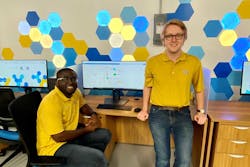UCF joins with FPL, GE to open on-campus Microgrid Controls Laboratory
Rod Walton, EnergyTech Senior Editor
Operating the microgrids of the future is the focus of a new research and development project at the University of Central Florida in Orlando.
UCF students are working in tandem with utility Florida Power & Light and GE Digital in the new on-campus microgrid control laboratory. The research facility features control-center equipment and software helping students simulate and test real-world grid control operations.
The microgrid market—a system offering power redundancy or even solely on-site energy to mission critical services such as the military, hospitals, public safety or industry—is currently valued at more than $6 billion annually, according to various reports. The revenue side of that sector could quadruple by the end of the decade, while companies such as Siemens Energy, Ameresco, Schneider Electric and Duke Energy are making significant investments in the growth prospects of low-emission microgrids.
Mission critical entities, meanwhile, are seeking energy security in the face of increasingly destructive weather events and the threat of cybersecurity attacks on the main grids.
The UCF microgrid control laboratory opened last week. FPL and GE Digital are sponsors, while university students are gaining hands-on experience testing nuanced systems incorporating and balancing energy flow. Microgrids typically can include solar power, battery storage and gas-fired or diesel gen-sets.
See EnergyTech's full coverage of the Microgrid Sector
Kwasi Opoku, a doctoral electric engineering student from Ghana, recounted how his home nation suffered from sometimes insufficient conventional power resources and occasional electricity rationing. In this UCF microgrid lab he can learn more about balancing resources and interacting with the major grid in a bidirectional way.
“You don’t always have hardware available to test, and usually you use simulation only,” Opoku was quoted in the UCF release about the microgrid laboratory. “This is as close to real-life as you can get.”
Subscribe to EnergyTech's free, thrice-weekly newsletter for more stories like this
The Central Florida campus also is home to the RISES (Resilient, Intelligent and Sustainable Energy Systems) team of faculty and students focused on research around lower or zero-carbon energy resources, controls and operations. The university has an on-campus solar farm.
“This new facility is exactly the kind of strategic partnership that makes UCF a premiere choice for students with future-focused career goals. GE Digital and FPL have been both philanthropic investors and design collaborators in this lab, ensuring our students in this field will be industry-ready on day one of their careers,” UCF President Alexander N. Cartwright said. “It’s a win-win. Our students get a leading education in a lab environment, and both companies open up a pipeline of incredible talent for their workforce.”
(Rod Walton, senior editor for EnergyTech, is a 14-year veteran of covering the energy industry both as a newspaper and trade journalist. He can reached at [email protected]).
About the Author
EnergyTech Staff
Rod Walton is head of content for EnergyTech.com. He has spent 17 years covering the energy industry as a newspaper and trade journalist.
Walton formerly was energy writer and business editor at the Tulsa World. Later, he spent six years covering the electricity power sector for Pennwell and Clarion Events. He joined Endeavor and EnergyTech in November 2021.
He can be reached at [email protected].
EnergyTech is focused on the mission critical and large-scale energy users and their sustainability and resiliency goals. These include the commercial and industrial sectors, as well as the military, universities, data centers and microgrids.
Many large-scale energy users such as Fortune 500 companies, and mission-critical users such as military bases, universities, healthcare facilities, public safety and data centers, shifting their energy priorities to reach net-zero carbon goals within the coming decades. These include plans for renewable energy power purchase agreements, but also on-site resiliency projects such as microgrids, combined heat and power, rooftop solar, energy storage, digitalization and building efficiency upgrades.
